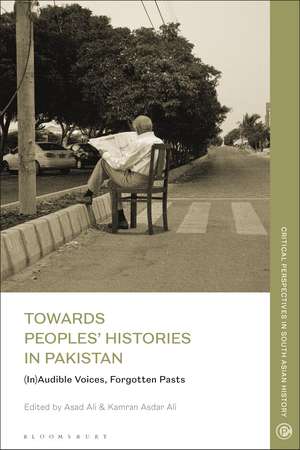Towards Peoples' Histories in Pakistan: (In)audible Voices, Forgotten Pasts: Critical Perspectives in South Asian History
Editat de Kamran Asdar Ali, Asad Alien Limba Engleză Hardback – 31 mai 2023
Preț: 511.89 lei
Preț vechi: 595.21 lei
-14% Nou
Puncte Express: 768
Preț estimativ în valută:
97.95€ • 102.53$ • 81.53£
97.95€ • 102.53$ • 81.53£
Carte tipărită la comandă
Livrare economică 01-15 aprilie
Preluare comenzi: 021 569.72.76
Specificații
ISBN-13: 9781350261198
ISBN-10: 135026119X
Pagini: 296
Ilustrații: 10 bw illus
Dimensiuni: 156 x 234 x 23 mm
Greutate: 0.59 kg
Editura: Bloomsbury Publishing
Colecția Bloomsbury Academic
Seria Critical Perspectives in South Asian History
Locul publicării:London, United Kingdom
ISBN-10: 135026119X
Pagini: 296
Ilustrații: 10 bw illus
Dimensiuni: 156 x 234 x 23 mm
Greutate: 0.59 kg
Editura: Bloomsbury Publishing
Colecția Bloomsbury Academic
Seria Critical Perspectives in South Asian History
Locul publicării:London, United Kingdom
Caracteristici
Interrogates the idea of people's history and populist politics in Pakistan
Notă biografică
Kamran Asdar Ali is Professor of Anthropology at the University of Texas, Austin. He is the author of Planning the Family in Egypt: New Bodies, New Selves (UT Press, 2002) and Communism in Pakistan: Politics and Class Activism 1947-1972 (I.B Tauris 2015). Ali has been the President of the American Institute of Pakistan Studies (AIPS: 2011-2017), the Director of the South Asia Institute, UT, Austin (2010-2017) and the Dean of the School of Humanities and Social Sciences at the Lahore University of Management Sciences. Asad Ali is an independent scholar based in the UK. He is the co-editor of Love, War and Other Longings: Essays on cinema in Pakistan (OUP 2020) and has taught at North American Institutions including New York University, Rutgers and Harvard. He is currently completing a manuscript entitled Languages of the Law: Islam, Liberalism and Moral Community in Pakistan.
Cuprins
List of Figures List of ContributorsIntroduction, Asad Ali (Independent Scholar, UK) & Kamran Asdar Ali (University of Texas, USA)Part I: Recalling "Progressive" HistoriesChapter 1: The Left and its Legacies: The Long 1960s in Pakistan, Kamran Asdar Ali (University of Texas, USA)Chapter 2: 'South Asia's Partitions and the Limiting of Progressive Possibilities in Pakistan.', Anushay Malik (Simon Fraser University, Canada) & Hassan Javid (University of Fraser Valley, Canada)Chapter 3: On Progressive Papers in Pakistan, Mahvish Ahmad (London School of Economics, UK), Hashim bin Rashid (SOAS University of London, UK) & Ahmad Salim (South Asian Resource and Research Centre, Pakistan)Part II: : Nationalism's Many ViolencesChapter 4: 1971: Pakistan's Past and Knowing What Not to Narrate, Nayanika Mookherjee (University of Durham, UK)Chapter 5: Left Behind by the Nation: 'Urdu Speakers' in Bangladesh, Dina Mahnaz Siddiqi (New York University, USA)Chapter 6: Invisible Borderlines, Naila Mahmood (Independent Scholar, Pakistan)Part III: Alternate Registers, Other HistoriesChapter7: Un-archiving Baloch History, Adeem Suhail (Franklin and Marshall College, USA)Chapter 8: Queer in the Way of History, Omar Kasmani (Free University of Berlin, Germany) Chapter 9: Gatherings of Commemoration: Performing Other Histories in Pakistan's Sufi Shrines, Amen Jaffer (Lahore University of Management Sciences, Pakistan) Chapter 10: Beyond "Forgotten Histories": Teesri Dhun (The Third Tune) as Collaborative Performance Research, Claire Pamment (The College of William and Mary, USA) Part IV: Politics and 'the People'Chapter 11: Tulba, Mazdoor aur Kissan (Students, Labourers and Peasants): The Revolution made Easy, Aasim Sajjad Akhtar (Quaid-i-Azam University, Pakistan) Chapter 12: The people in their difference, Humeira Iqtidar (King's College London, UK) Chapter 13: Countering the production of cultural hegemony: Reflections on women's activism under Zia, Farida Shaheed (Shirkat Gah-Women's Resource Centre, Pakistan) Chapter 14: Political Emotion and Bodily Politics: Zulfikar Ali Bhutto and 'The People', Asad Ali (Independent Scholar, UK)Index
Recenzii
Histories can legitimize political power, just as they can be used to challenge power, sometimes in revolutionary ways. In Pakistan, state power has long been deployed to control national narratives, even amidst territorial fragmentation and deep inequality. The agenda of this exciting collection of essays is to show us the multiplicity and vitality of other popular narratives of the past, whether engaged with the nation and its temporalities or not.







